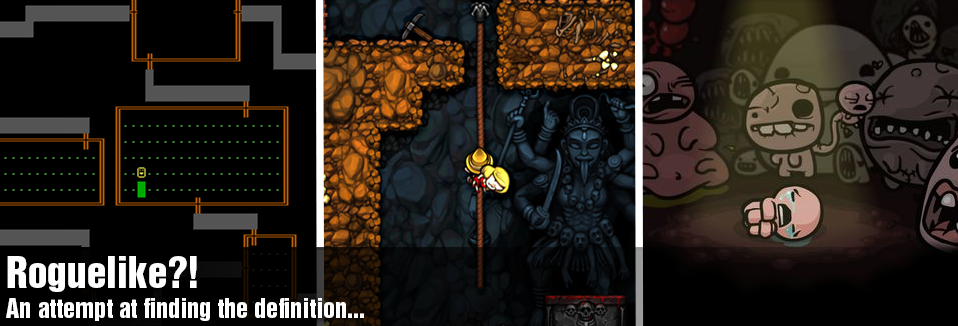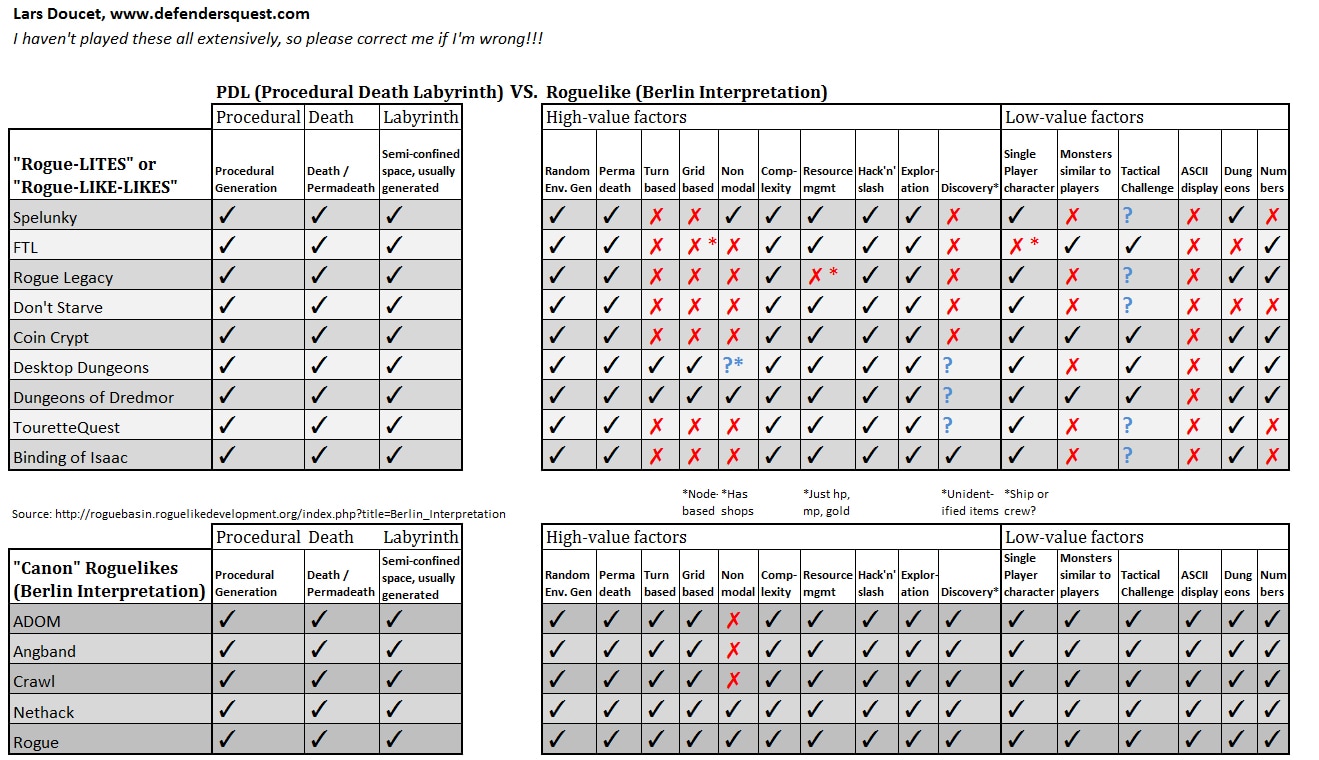|
|
Personal Projects
|
|
|
While doing research for this blog, I’ve often come across games being referred to as “Roguelike.” Even working in the gaming industry, I haven’t encountered this term used all that often… so I decided to do a bit more research into what is Roguelike? What I found was a lot of drama and controversy surrounding the term and it’s usage. In today’s post I’ll be exploring the origins of this term, it’s usage, and a bit about the debate surrounding it. Before getting into one of many definitions for the term Roguelike, it’s best to start with the origin of the word. Roguelike is actually referring to a game that was released in 1980 called Rogue : Exploring the Dungeons of Doom. In Rogue, players explore procedurally generated dungeons looking for treasures and fending off monsters. Rogue was notable for not only having procedurally generated dungeons, but also permadeath and turn based mechanics within an environment generated with ASCII or other fixed character sets. Rogue was inspired by text-based computer games, such as the 1971 Star Trek game and Colossal Cave Adventure. Rogue was popular in the 1980s among college students and other computer users at the time, inspiring similar titles such as Hack and Moria. Both of these games brought forth a family of improved versions and clones over the next several years, and led to a wide number of games in a similar flavor… only increasing the popularity of the original “Rogue” game. Games which generally featured turn-based exploration, combat in a fantasy setting, procedurally generated dungeons, and permadeath are often referred to as “Roguelike.” Looking for a modern definition of Roguelike can lead to some discrepancy. Wikipedia offers a broad definition of Roguelike, defining it as a “subgenre of role-playing video games characterized by a dungeon crawl through procedurally generated game levels, turn-based gameplay, tile-based graphics, and permanent death of the player-character.” Although looking deeper into the article, I found many of the modern reference only include some of these elements and not necessarily all ingredients. I decided to dig a little deeper, and what I found was a lot of conflicting opinions. The first, potentially official, source I found was something referred to was the “Berlin Interpretation.” Honestly I was a bit shocked to find something so official sounding, but what the Berlin Interpretation refers to an agreement made at the International Roguelike Development Conference 2008. This discussion defined both High and Low value factors of what can be used to define if a game is “Roguelike” or not. If you’re interested in learning more about these low and high value factor definitions, you may want to check out this link. Although in an article about “PDL,” or Permanent Death Labyrinth, I found this interesting chart that both highlights the factors from the Berlin Interpretation… and challenges it a bit : Meanwhile there still seems to be two very different trains of thought, both of which actually disagree with the Berlin Interpretation. The way I will define these two camps are the Purists and the Progressives. The Purists believe in a strict interpretation of the term “Roguelike” and believe that, in order for games to be Roguelike, games need to adhere to a strict criteria to be considered similar to the original game. Meanwhile more Progressive believers feel as though the term Roguelike needs to be modernized and adapted to a more loose criteria… one that may fit more modern games. I'm not arguing that any of these are "Roguelikes," these are images pulled from games that are tagged "Roguelike" on Steam.
There are those who believe the entire use of the term Roguelike to be too ambiguous, and argue for a new term be used called “Procedural Death Labyrinth” or PDL. They argue for a more concise definition that can be easily applied to games of this genre. The name by itself contains all the information needed for someone to understand the gameplay style.
For me, it feels as though there too many different mechanics at play within the definition of Roguelike as a genre. When we examine other genres they typically refer to very few concrete game mechanics… For example : “First-person shooter (FPS) is a video game genre which is centered on gun and projectile weapon-based combat through a first-person perspective; that is, the player experiences the action through the eyes of the protagonist.” - Wikipedia “A Platform game (or platformer) is a video game which involves guiding an avatar to jump between suspended platforms and/or over obstacles to advance the game.”- Wikipedia There’s very little room for debate when these game definitions are in play, and within modern gaming you can definitely have a platformer that is also a FPS. It feels awkward to associate the term “Roguelike” under the same family of game genre definitions, where the definition could mean one or many possible gameplay mechanics… depending on who you’re speaking with. So why do we care? I couldn’t help but ask this question as I dug deeper into the topic. Was this just pure nerd rage fueled by nostalgia? Are we seeing this term used more frequently because it’s just a marketing buzzword? I don’t believe there’s one right answer to this question, yet I found this quote that I think describes why people might be so passionate about defining these games : “The random nature of a roguelike means that you're not trying to perfect a pattern, but that you're using your understanding of systems to cope with the unexpected events. Each time you use your knowledge to survive a little longer or do a little better. So a roguelike is not about mastering one situation, but surviving many situations and doing better each time. That's the appeal for me.“ --- CaptRobau -- Reddit Under this logic, Roguelike games encourage users to master the systems within the game. There’s a euphoria that exists when you become flexible enough to manage the randomness that a game throws your way, which is different than memorizing a pattern. I believe the passion that follows this feeling, coupled with the urge to differentiate this style of gameplay from others, has fueled this debate. In any case I’m not here to push an opinion on this topic, yet I found it really interesting once I discovered so much debate regarding it! I’m sure there’s probably more depth to this topic that I have yet to discover, but for now thanks for reading and I hope you enjoyed!
0 Comments
Leave a Reply. |
AuthorI make games, I play games... and sometimes I have some thoughts about that. Archives
March 2024
|
Proudly powered by Weebly















 RSS Feed
RSS Feed